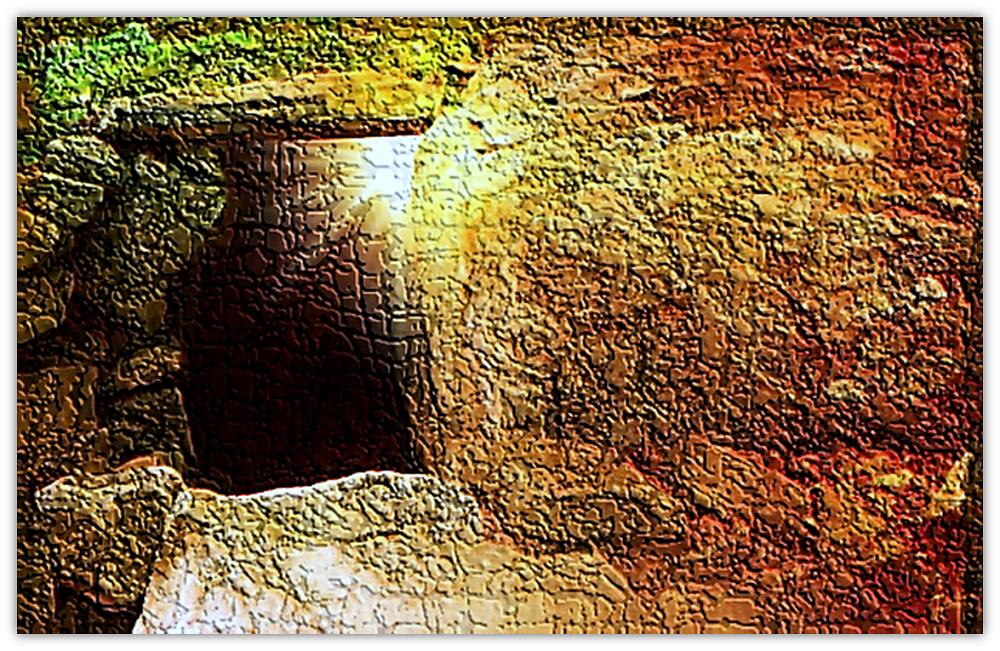Jesus as the Risen King
Jesus as the Risen King

At his crucifixion Jesus was mocked in his kingship. The leaders of the people, the soldiers, and the mocker crucified next to Jesus all tried to portray his saving work as a ridiculous exercise. Extensive coverage is given to his assumed inability to save. Initially it seems to all appearances that the death on the cross of the man in the middle put an end to all his pretensions.
Neither friend nor foe counted on an actual turn in the course of these things. The enemies rejoiced while the Saviour’s friends were totally distraught and dismayed. In the midst of this desolate situation for the followers of Jesus, God employs women to be the first witnesses of the resurrection.
An Unexpected Twist⤒🔗
Also in this section of the Gospel according to Luke do we find the surprising character of God’s work of salvation. It is so different from what we may expect in that Eastern culture. Luke 23 (vv. 55-56) closes with the women’s acts of love, and Luke 24 opens up with them. The scope of their labour is focused entirely on the care for the dead Saviour. Astonishingly, these women are turned into the first witnesses of God’s work of salvation in the Resurrected One.
Through the mouths of angels they are led back on the way of the spoken Word (Luke 24:6-7; cf. 9:22; 17:25). The instruction of their Lord and Saviour is brought to their remembrance (Luke 24:8). In the manner in which Luke describes the Easter history, “remembering” plays a key role. It is through remembering God’s Word that there is a real turn in the women’s understanding. They receive perspective on God’s plan of salvation in the resurrection of his Son. The women, however, with this heavenly and glorious message do not make any sense to the disciples. Initially, God’s message does not capture them (Luke 24:11).
The Hidden Saviour←⤒🔗
In the central part of Luke 24 we find two very disillusioned people walking from Jerusalem to Emmaus. For them, Easter has not arrived yet. They are in a deep conversation about all the developments of the last few days. When a third person joins them, the stranger’s apparent ignorance gives Cleopas full opportunity to pour out his heart. The recent crucifixion in Jerusalem keeps them intensely busy. Their description of what has happened with regard to Jesus the Nazarene, having been delivered, condemned, crucified and killed, sizzles with loaded concepts such as “a prophet,” “mighty in deed and word before God” (Luke 24:19-20).
And then we read verse 21, which witnesses of the hope and expectation they had harbored together with many others. In this Man of Nazareth they had discovered traits of a saviour. With all their being they were focused on a wonderfully liberating act of God. Once again we hear in the recorded gospel the expression of the key concept “to save.” Several times in Luke 23 a base word is used that means “to save” or “to rescue.” In Luke 24:21 a word is used that can also be represented as “to bail someone out for a ransom.” “The one to redeem Israel.”

But that hope is dashed entirely! It has been hopeless and desolate for them for three days now. Then there were those alarming and confusing reports from the women, who claimed to have received messages from angels. The women assert that he lives. The men have been unable to verify this. They only saw the empty tomb but they haven’t seen Jesus! In this report you can make out their strong doubt. “We had hoped for salvation, but that path has now died.”
The Living Word←⤒🔗
For these two travelers there was actually nothing left that could provide them with any ground to kindle their earlier hope for salvation. They stared themselves blind on a dead Saviour. So he was not the expected, hoped-for Saviour.
That’s when Cleopas and his companion receive instruction that first of all admonishes them. How so? Especially their unbelief with regard to the message of the prophets is criticized in Luke 24:25.
Then Jesus breaks through the limited expectation of the travellers to Emmaus from the time before the crucifixion; they had seen in him a prophet. The Risen One corrects this by asking their attention for all that the prophets have spoken. It is not just about a prophet, but it concerns the suffering Messiah. In this instruction Christ sets their hearts aflame. A beautiful light shines on the instruction of Moses and the prophets (Luke 24:27). The Saviour brings things into focus on the road to Emmaus. It is about the Messiah who had to suffer. We will be looking for direct Old Testament text references in vain. The main aim of the Saviour as the great Interpreter is to show the main thrust of the Law and the Prophets. He teaches them to read what God has revealed in the Old Testament.
Then a very special light begins to shine on the suffering of Jesus of Nazareth, namely, the light of the Lord and Messiah. This is explicitly mentioned in Luke’s second book, in Acts 2:36. God has made him both Lord and Christ, this Jesus who was crucified. This message sounds forth clearly and revealingly on the first day of Pentecost from the mouth of the apostle Peter. We already find that line in Luke 24:26 when we hear about his entry into glory (cf. Luke 9:26). This motif of fulfillment is also encountered in Luke 24:44-46. The word “glory” is not used in that context, but it does speak of his resurrection on the third day. Through this instruction in the Word, the Risen One is actively engaged in drawing the two of them to the certainty of God’s saving action. Because of this, his suffering and glory receive a very different, new light – a light in which the salvation through his kingship takes on a whole new and wide dimension. The tension of this passage is pictured in a beautiful way: it progresses from eyes closed due to hopelessness to opened eyes for him who truly reveals himself in the breaking of the bread. From desolation and serious doubt they are now transfixed and set aflame through the Word, so that hope again shines on the horizon of their life!
Special Meaning←⤒🔗
Through this exposure based on the Word their earlier longing for salvation now receives special meaning. What they initially had presumed to be the end — the death on the cross at Golgotha — is now shown to be God’s plan of salvation, the way in which God’s people are ransomed. The opponents had thought to deal the great, final, decisive blow. Through condemnation and crucifixion they intended to finish the Nazarene off once and for all. As the mockers around the cross vilified his kingship, the King was busy to free his people from sin and guilt. Straight through everything they thought to gain, the King of the Cross has paid the ransom for the redemption of sinners. The shameful suffering on the cross is not an inglorious end, but a means in God’s hand to bring his Messiah to glory. In the faithful execution of his high and holy calling, the essence and work of the Messiah are fully revealed.
At the table in Emmaus, the Risen Saviour looks for closer contact with Cleopas and his companion. While breaking the bread, he gives them a glimpse of his glorified life. It is at that moment that the spark of recognizing love jumps over. The liberating power of his instruction in the Word forces its way into a glorious future.

A Marvellous Kingship←⤒🔗
All in all it’s a marvelous turnaround with the kingship of the Messiah. Especially in the description of Luke it becomes clear time and again that Easter is not in the first place a matter of the eyes, but of the ears. The resurrection has everything to do with remembering the words that Jesus had spoken during his time on earth. The travellers to Emmaus do not immediately gain sight of the Risen One in his resurrection body. They are, without realizing it initially, led by the Risen One in the way of the Word. Moses and the Prophets are illuminated and made transparent in such a way that the sparks of recognition begin to fly. Apparently it means a great deal to Luke to home us in on the message the Messiahship of King Jesus. It is in the first place a matter of our heart being ready to listen to God’s Word, more so than for our eyes to see. Worldly glory and political power are not the Messiah’s seal of authenticity, but instead it is God’s salvation through suffering unto glory that shows the trustworthiness of his person and work.
For Christians living today it is important, in the midst of the hopelessness and despair that we often witness, to have the courage of faith to be living witnesses of the Messiah and his salvation. Then the offensiveness of his way of suffering will be non-negotiable as the way of salvation, determined by God’s plan. That touches the essence of faith, which trusts in God and in his promise, in spite of the fact that here and now so often we observe the opposite. Then on the road with him our heart burns with love for this King. We offer him as risen Lord all the glory, and we take up our cross with a view on him and his second coming.

Add new comment